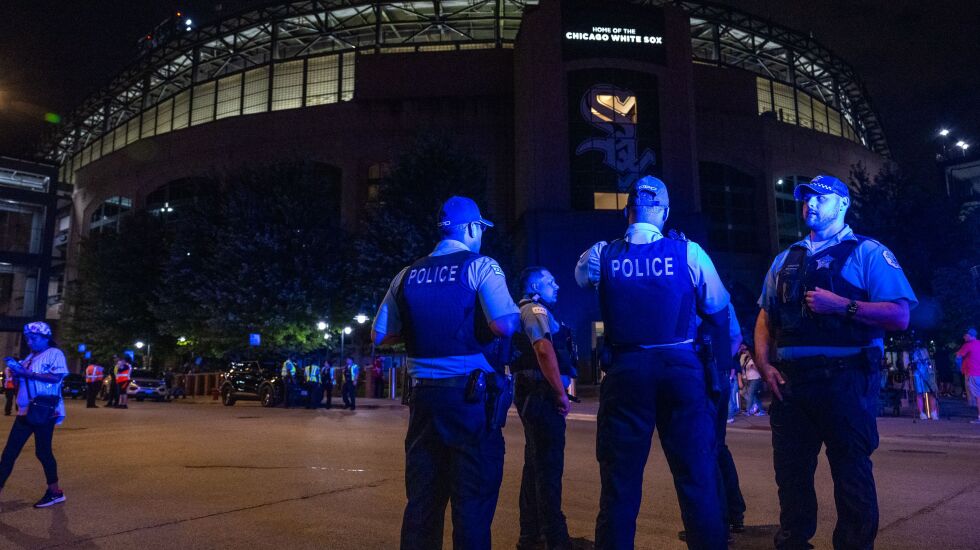
Chicago’s top cop defended the decision to allow Friday’s White Sox game to continue after two fans were struck by gunfire in the bleachers, but he still couldn’t provide a clear explanation of what happened three days after the alarming incident.
Interim Police Supt. Fred Waller told reporters Monday that investigators have “almost completely dispelled” a theory that one or more bullets were fired from outside the stadium, wounding two women.
“But we’re still looking at every avenue,” Waller said after a police graduation ceremony. “It’s still under investigation.”
During the third inning of the night game against the Oakland Athletics, a 42-year-old woman was struck in the leg and a 26-year-old woman was grazed in the abdomen, Chicago police have reported. The older woman was rushed to University of Chicago Medical Center, while the younger woman refused treatment.
The most seriously wounded woman told a doctor in the park that she heard what sounded like a “glass bottle break” before feeling a sting in her leg.
The Sun-Times reached out to both women, but one declined comment and the other did not answer phone calls or come to her door.
Waller said police initially urged the Sox to call off the game as a “precaution,” given that officials initially “did not know what was going on.”
When paramedics discovered that the older woman had been shot, police didn’t see any threat of an active shooter or “flare from a weapon.”
He said the game was allowed to proceed because officials couldn’t immediately confirm there was a shooting and didn’t want to “create a panic.”
Scott Reifert, the White Sox vice president of communications, said the organization hadn’t “heard anything official” about the determination that the gunfire likely originated in the ballpark.
“We’re aware of the superintendent’s comments,” Reifert said. “But we have not been contacted directly by the police to have a conversation about kind of what theory they’re following in place of that.
“We said on Friday night … it just wasn’t clear at that time whether it was inside or outside,” he said.
Reifert said the decision to allow the game to continue fell completely to the police department, though he acknowledged that officials consulted with the team’s security personnel. “It was determined that there was no immediate threat, and so the game proceeded,” he added.
A concert after the game was canceled to allow the department to investigate without fans in the stadium — not over security concerns, Reifert said.
As the organization waits to learn what happened from the police department, he said it’s difficult to adjust security protocols. “We’re not even sure what we’re adjusting for until we have a clearer picture,” he said.
Michael Teevan, a spokesman for Major League Baseball, didn’t immediately respond to questions. He previously told the Sun-Times that it was “the prevailing belief that the bullets came from outside the ballpark and that there was not a threat inside.
A University of Chicago Medical Center doctor who was at the ballgame and who tended to both women said she heard no gunfire and noticed no commotion coming from the crowd. Dr. Jeanne Farnan said a man came running up the stairs, waving his hands over his head and calling for security.
“I asked him if there was a medical emergency and he said, ‘Yes, there’s a woman that’s bleeding a lot,’” Farnan said. “I walked down about five or six rows and found the woman seated with her right leg up on the bench.”
Farnan said the woman’s companion was applying pressure to the wound and “there was a lot of napkins and quite a bit of blood on the ground.”
Farnan, along with an emergency medical technician at the scene, inspected the wound and determined it was a “very obvious gunshot wound to the right thigh.”
“The EMT and I kind of looked at each other like, whoa, and he continued to apply pressure and gauze,” she said.
As the EMT tended to the woman’s wound, a second woman showed her injuries to Farnan. She had a graze wound on her abdomen that resembled a cigar burn, the doctor said.
Later, another woman approached Farnan and dropped a bullet into her hands, which Farnan said she handed over to security.
“I gave it to the person who looked to be in charge,” Farnan said. “And I gave my name, if they needed it, what the patient’s condition was in terms of their vital signs, my level of concern and who I thought needed further medical attention.”
Contributing: Sophie Sherry, Rosemary Sobol







